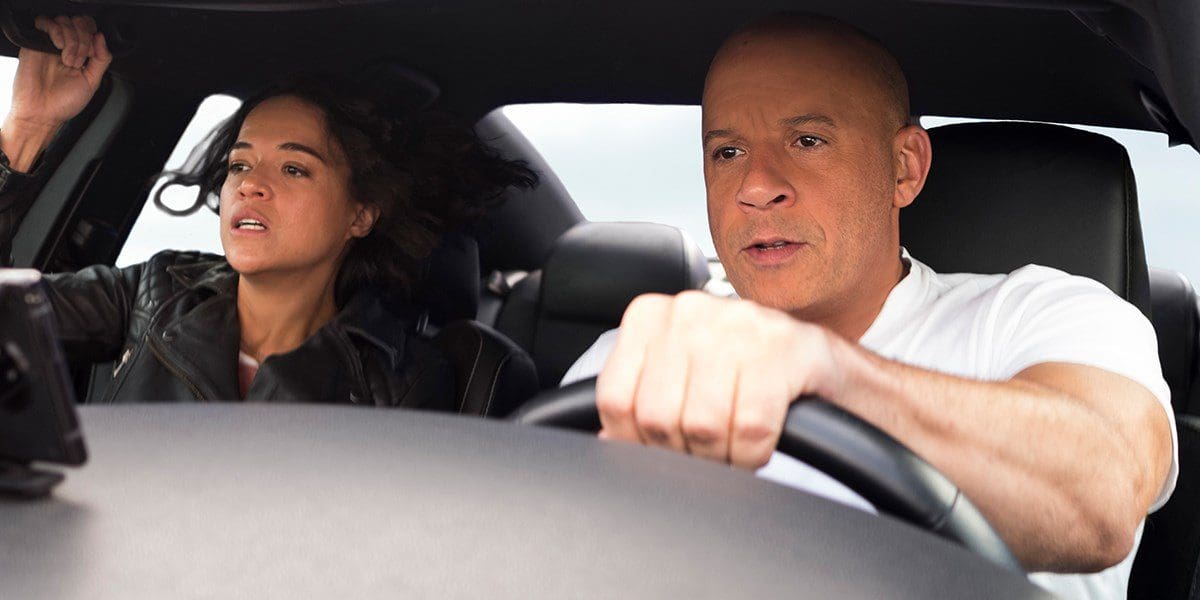
Written by Sam Niles
What started as a modest Point Break-with-cars action thriller has now gone to space. Literally. But, against all odds, director Justin Lin embraces that origin and the Fast franchise’s absurd new scope in equal measure, exploring that dichotomy through themes of the past and future. As a result, F9: The Fast Saga is pure, unadulterated Fast and the Furious — and may very well be the best of the franchise.
The opening is, in many ways, foundational. A flashback, the scene introduces us to Dom’s (Vin Diesel/Vinnie Bennett) father and brother, Jack (JD Parro) and Jakob (John Cena/Finn Cole). Dom and Jakob are on Jack’s pit crew during a race, wherein tragedy strikes. This tragedy sets up the brothers’ eventual rivalry, and it’s on this rivalry that the future of humanity rests.
These flashbacks aren’t a one-and-done thing. They’re a recurring subplot and shot on 35mm, in contrast to the digital cameras used for the present day. The change in format isn’t just trivial — rather, each timeline has a look that complements the story. These distinctions resonate as early as the first shot — a hazy, grainy view of a race track with a beautiful, nostalgic texture. The franchise has always been about cars, but with the massive expansion in scope, the sight of an old fashioned race track feels almost foreign at first. The “back to basics” feeling in the opening doesn’t rein in the absurdity. The characters have super magnets that attract cars through buildings and they’re still super spies. But this opening is the foundation upon which the absurdity rests.
It’s this foundation that makes the unrelenting action so much fun. The cars are extensions of the characters, and no matter how loud, silly, and utterly impossible the action may be, there is always a sense of both the placement and value of the characters in each scene. That includes the characters’ and actors’ physicality, making for rich visual storytelling. There is no better example than the relationship between Dom and Jakob. When tragedy strikes in that first flashback, a slow-motion pan from a screaming Dom to a straining Jakob leaves the audience with questions. Why is he so focused? Is he holding back tears, or a smile?
This simple contrast doesn’t answer every question (at first). We don’t know why there’s a rivalry, for one. But it does tell us there is a rivalry, and adds weight to the characters’ antagonistic demeanor throughout F9. It communicates their contempt, as if they’re both standing on solid ground in direct opposition to each other. Take Jakob’s introduction in the present day timeline, which has him stepping out of his car with a family heirloom around his neck, watching Dom making chase from afar. It’s simple visual storytelling that communicates their history. Jakob is shown as an equal and a forgotten but familiar threat.
The franchise is famous for reminding us that family is more than blood, but what happens when the inverse is explored? What happens when your blood becomes your enemy? All of this is communicated with that one image, and each image is as dense as the last. It’s maximalist filmmaking at its finest, because it’s not just nonsense piled onto nonsense, but nonsense crafted with grace and care. To take a page from Taika Waititi on Star Wars: “It doesn’t take itself seriously, but it does believe in itself.”
There’s belief in every frame of F9. It’s spectacle with focus, heart, and audacity, wherein something as silly as a car going into outer space will bring tears to your eyes.


Comments are closed.